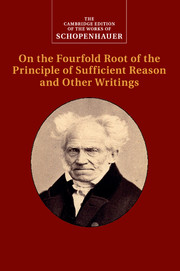Book contents
- Frontmatter
- Contents
- General Editor’s Preface
- Editorial Notes and References
- Introduction
- Notes on Text and Translation
- Chronology
- Bibliography
- Collation of the Two Editions of On the Fourfold Root
- 1 On the Fourfold Root of the Principle of Sufficient Reason
- 2 On Vision and Colours
- 3 On Will in Nature
- Glossary of Names
- Index
Preface
Published online by Cambridge University Press: 30 June 2022
- Frontmatter
- Contents
- General Editor’s Preface
- Editorial Notes and References
- Introduction
- Notes on Text and Translation
- Chronology
- Bibliography
- Collation of the Two Editions of On the Fourfold Root
- 1 On the Fourfold Root of the Principle of Sufficient Reason
- 2 On Vision and Colours
- 3 On Will in Nature
- Glossary of Names
- Index
Summary
This treatise in elementary philosophy, which first appeared in the year 1813, when I had gained my doctorate with it, has since become the underpinnings of my whole system. For this reason it cannot be allowed to remain out of print, as has been the case for four years, without my knowing it.
However, to send such a youthful work into the world again now with all its flaws and faults seems to me to be irresponsible. For I am aware that the time in which I will no longer be able to emend it cannot be very far distant, but with time the period of my real effectiveness will first appear, and that it will be a long period I am consoled by a firm trust in Seneca's promise: ‘although envy imposed silence on everyone living with you, they will come who will judge without offence and without partiality’ (Letters 79). I have, therefore, as far as it is possible, helped the present youthful work and given the brevity and uncertainty of life, I must even regard it as a special good fortune that it has been granted me in my sixtieth year still to correct that which I had written in my twenty-sixth.
But now, in doing so, it has been my plan to deal with my youthful self indulgently, and as far as it is ever possible, to let him have his say and to speak freely. But where he advanced something incorrect or superfluous, or even omitted the best part, I have had to cut him off, and this has often enough been the case, so that perhaps many will get the same impression as when an old man reads a young man's book aloud, but often puts it down in order to indulge his own digressions on the theme.
It is easy to foresee that a composition of this sort, improved after so long a time, could never again achieve the unity and finish that belongs to one that is a harmonious whole. Even in style and execution, such an unmistakable difference will make itself palpable that the sensitive reader will certainly never be in doubt whether he hears the cadence of the old or the young man.
- Type
- Chapter
- Information
- Schopenhauer: On the Fourfold Root of the Principle of Sufficient Reason and Other Writings , pp. 3 - 4Publisher: Cambridge University PressPrint publication year: 2012

